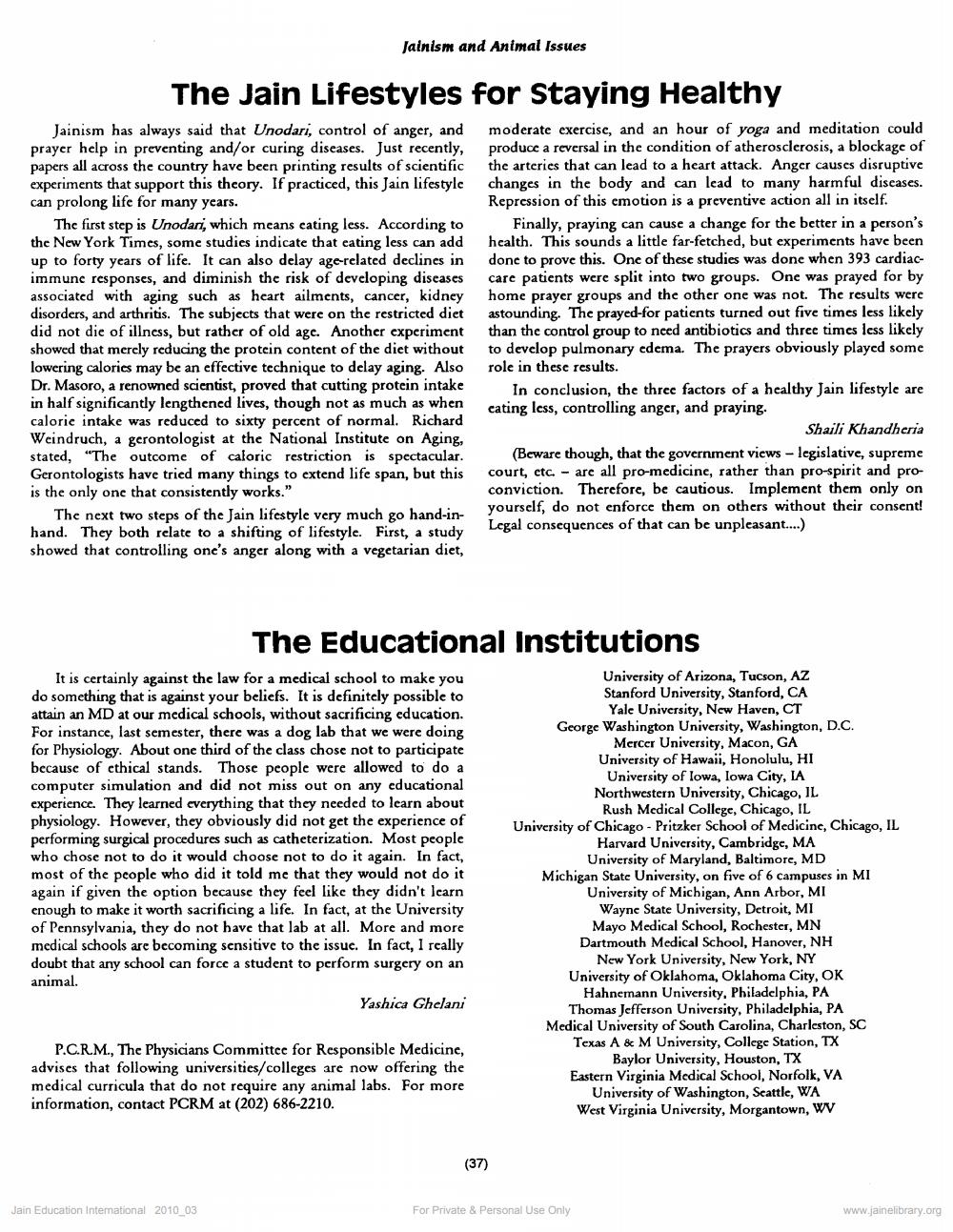________________
Jainism and Animal Issues
The Jain Lifestyles for Staying Healthy
Jainism has always said that Unodari, control of anger, and prayer help in preventing and/or curing diseases. Just recently, papers all across the country have been printing results of scientific experiments that support this theory. If practiced, this Jain lifestyle can prolong life for many years.
The first step is Unodari, which means eating less. According to the New York Times, some studies indicate that eating less can add up to forty years of life. It can also delay age-related declines in immune responses, and diminish the risk of developing diseases associated with aging such as heart ailments, cancer, kidney disorders, and arthritis. The subjects that were on the restricted diet did not die of illness, but rather of old age. Another experiment showed that merely reducing the protein content of the diet without lowering calories may be an effective technique to delay aging. Also Dr. Masoro, a renowned scientist, proved that cutting protein intake in half significantly lengthened lives, though not as much as when calorie intake was reduced to sixty percent of normal. Richard Weindruch, a gerontologist at the National Institute on Aging, stated, "The outcome of caloric restriction is spectacular. Gerontologists have tried many things to extend life span, but this is the only one that consistently works."
The next two steps of the Jain lifestyle very much go hand-inhand. They both relate to a shifting of lifestyle. First, a study showed that controlling one's anger along with a vegetarian diet,
It is certainly against the law for a medical school to make you do something that is against your beliefs. It is definitely possible to attain an MD at our medical schools, without sacrificing education. For instance, last semester, there was a dog lab that we were doing for Physiology. About one third of the class chose not to participate because of ethical stands. Those people were allowed to do a computer simulation and did not miss out on any educational experience. They learned everything that they needed to learn about physiology. However, they obviously did not get the experience of performing surgical procedures such as catheterization. Most people who chose not to do it would choose not to do it again. In fact, most of the people who did it told me that they would not do it again if given the option because they feel like they didn't learn enough to make it worth sacrificing a life. In fact, at the University of Pennsylvania, they do not have that lab at all. More and more medical schools are becoming sensitive to the issue. In fact, I really doubt that any school can force a student to perform surgery on an animal.
Jain Education International 2010_03
Yashica Ghelani
P.C.R.M., The Physicians Committee for Responsible Medicine, advises that following universities/colleges are now offering the medical curricula that do not require any animal labs. For more information, contact PCRM at (202) 686-2210.
moderate exercise, and an hour of yoga and meditation could produce a reversal in the condition of atherosclerosis, a blockage of the arteries that can lead to a heart attack. Anger causes disruptive changes in the body and can lead to many harmful diseases. Repression of this emotion is a preventive action all in itself.
Finally, praying can cause a change for the better in a person's health. This sounds a little far-fetched, but experiments have been done to prove this. One of these studies was done when 393 cardiaccare patients were split into two groups. One was prayed for by home prayer groups and the other one was not. The results were astounding. The prayed-for patients turned out five times less likely than the control group to need antibiotics and three times less likely to develop pulmonary edema. The prayers obviously played some role in these results.
The Educational Institutions
In conclusion, the three factors of a healthy Jain lifestyle are cating less, controlling anger, and praying.
Shaili Khandheria
(Beware though, that the government views - legislative, supreme court, etc. are all pro-medicine, rather than pro-spirit and proconviction. Therefore, be cautious. Implement them only on yourself, do not enforce them on others without their consent! Legal consequences of that can be unpleasant....)
(37)
University of Arizona, Tucson, AZ Stanford University, Stanford, CA Yale University, New Haven, CT George Washington University, Washington, D.C. Mercer University, Macon, GA University of Hawaii, Honolulu, HI University of Iowa, Iowa City, IA Northwestern University, Chicago, IL Rush Medical College, Chicago, IL
University of Chicago - Pritzker School of Medicine, Chicago, IL Harvard University, Cambridge, MA University of Maryland, Baltimore, MD
Michigan State University, on five of 6 campuses in MI University of Michigan, Ann Arbor, MI Wayne State University, Detroit, MI Mayo Medical School, Rochester, MN Dartmouth Medical School, Hanover, NH
New York University, New York, NY University of Oklahoma, Oklahoma City, OK Hahnemann University, Philadelphia, PA Thomas Jefferson University, Philadelphia, PA Medical University of South Carolina, Charleston, SC Texas A & M University, College Station, TX Baylor University, Houston, TX Eastern Virginia Medical School, Norfolk, VA University of Washington, Seattle, WA West Virginia University, Morgantown, WV
For Private & Personal Use Only
www.jainelibrary.org




